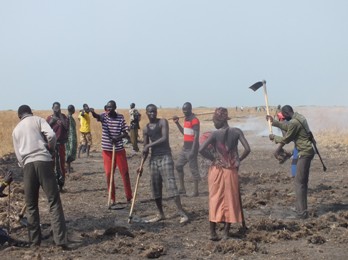Communities embark on works to repare for future crisis in Jonglei state.
March 12, 2015 (BOR) – Communities in Jongei state’s Twic east and Bor counties have embarked on upgrades on key roads that helped save lives during the evacuation process following the eruption of violence in mid-December 2013 and January last year.

CRS launched the project in 2011 to help the communities create assets like roads, dykes and water pans depending on the needs, after which food aid is distributed to participants upon the completion of at least 20 days work.
In the capital, Bor, the road connecting Langbar, Arek and Payueny had become overgrown, but has now been reopened by the community.
The road allowed hundreds of thousands of people who lived in Bor town to be evacuated to safer areas across the river to Lakes states as the violence escalated.
“During the crisis, a lot of people used this road for evacuation to the river side. After realising that the road was important, we asked [the] CRS to support us in clearing it. We got the food support and we are doing it,” David Deng, an assistant chief in Payueny of Bor town.
“It is also connecting the village, where over 10,000 children live, to the school,” he added.
The road also makes for the easy transportation of building materials and other essential items, said Deng.
Similar road works are being done in Twic East where the community in Marial Boma in Paker payam (district) is working to construct a new road connecting their village from the main road to swamp areas, where boats and canoes can easily ferry people across should there be any further attacks on their villages.
“We don’t want to be caught unprepared by another crisis. It was a challenge for us to move our cattle, goats, children and women and even the crippled during the bad times between December 2013 and April 2014,” Michael Kur Atem, a village resident in Marial Boma in Pakeer payam, said on Thursday.
“That is why we are opening this road to be used by motorbikes and vehicles for evacuations,” he added.
Clearing works along a 6km stretch of road began on Monday and is expected to finish within two weeks.
The community feels the road will offer an important evacuation route in the event of further violence.
Manyok Kuol Atem said while the road had saved lives, helping connect people along the main road to swampy areas, it had been difficult for weaker people to reach there when fighting broke out in Maar in November 2012, with over 40 people killed and thousands of heads of cattle stolen by suspected Murle raiders.The same road was used as an evacuation route in January 2014 when communities fled amid fears of further attacks by rebel forces led by Riek Machar.
“The work, once the first stage is completed, it will be levelled manually by the communities, not because we need food or work, but we need our children and women to be at the safer side,” said Kuol.
There is concern that the current conflict between the South Sudanese government and pro-Machar rebels will again erupt in a full-scale war following the collapse of peace talks and the community are currently considering evacuating again as a precaution rather than waiting for an attack.
Communities have been allocated different sections of the road and each local chief is responsible for ensuring the works are carried out.
The ratio of women to men was high, and although some were old they were still able to work.
Workers received a 50kg bag of sorghum, 5 kgs of peas and about 3.5 litres of oil for their toil.
General food distribution in the region has been stopped, so the latest assistance has been particularly beneficial to women still nursing small children.
“We work to create an asset for ourselves, and in turn, we receive food which is our immediate reward. This is a very good thing I witnessed,” said Ayen Dau, 27, in Twic East’s Maar town.
“My son doesn’t always remain without food for a long time. I make sure I work to get it,” she added.
The projects inspectors from CRS declined to comment due to restriction imposed on them by their authorities in the Bor head office.
(ST)
